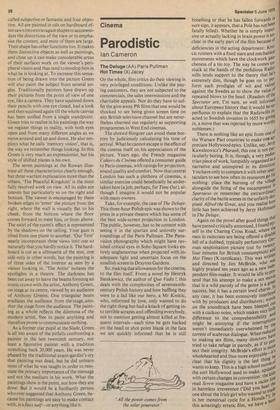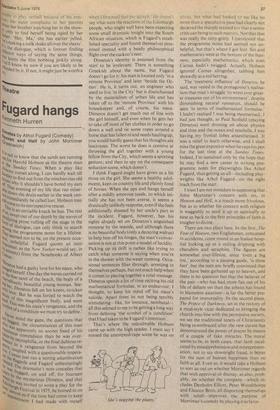Cinema
Parodistic
Ian Cameron
The Deluge (AA) Paris Pullman Hot Times (X) Jacey On the whole, film critics do their viewing in very privileged conditions. Unlike the paying customers, they are not subjected to the commercials, the sales intermissions and the charitable appeals. Nor do they have to suffer the give-away PR films that one would be shocked to see being given screen time on any British television channel but are nevertheless churned out regularly as supporting programmes in West End cinemas.
The shrewd filmgoer can avoid these horrors by judiciously calculating his time of arrival. What he cannot escape is the effect of the cinema itself on his appreciation of the picture. Years ago, the French magazine Cahiers du Cinema offered a consumer guide to Paris cinemas, with ratings for projection, sound quality and comfort. Now that central London has such a plethora of cinemas, a similar exercise could beneficially be undertaken here (a job, perhaps, for Time Out), although I imagine it would not be popular with many owners.
Take, for example, the case of The Deluge. This three-hour Polish epic was shown to the press in a private theatre which has some of the best wide-screen projection in London. The public, however, has to be content with seeing it in the spartan and unlovely surroundings of the Paris Pullman. The Panavision photography which might have ravished critical eyes in Soho Square looks entirely unglamorous when projected with inadequate light and uncertain focus on the smallish screen in Drayton Gardens.
So, making due allowances for the cinema, to the film itself. From a novel by Henryk Sienkiewicz, the author of Quo Vadis?, this deals with the complexities of seventeenthcentury Polish history and how baffling they were to a lad like our hero, a Mr Kmicic, who, reformed by love, only wanted to do the right thing but had a knack of getting into terrible scrapes and offending everybody, not to mention getting almost killed at frequent intervals—each time he gets hacked on the head or shot point blank in the face we are quickly informed that he is still
Spectator 5 June 976 breathing or that he has fallen forwards (a sure sign, it appears, that a Pole has not been fatally felled). Whether he is simply imPulsive or actually lacking in brain power is ult" clear in the early part of the film because of deficiencies in the acting department : Knit' cic roisters with a fixed stare and mechanical movements which have the clockwork gaw cheness of a tin toy. The way he comes on' stuck at the hands of the perfidious Radzie wills lends support to the theory that he's extremely dim, though he goes on to Per' form such prodigies of wit and valour against the Swedes as to show the value of repeated blows to the head. (Readers of the, Spectator are, I'm sure, so well inforrnee about European history that it would be su' perfluous to explain that the Radziwills re' acted to Swedish invasion in 1655 by in, a move that was rejected by more wort"' noblemen.) There is nothing like an epic from one t:lf the Warsaw Pact countries to make one alY preciate Hollywood epics. Unlike, say, JellY Kawaleowicz's Pharaoh, this one is not Particularly boring. It is, though, a very Poles' trian piece of work, lumpishly organised asa narrative and uninspired in its direction. You have only to compare it with other Wee' taculars to see how often its resources go f°,I* nothing: place the burning of the villat alongside the firing of the encampment Spartacus or remember the extraordinarY clarity of the battle scenes in the unfairly des' pised Alfred the Great, and you realise 110 little has been achieved by Jerzy Hoftrnann in The Deluge. Again on the prowl after good things that have passed critically unnoticed, I found11; self in the Charing Cross Road, where rt,"ie men in raincoats are being offered a dottu bill of a dubbed, typically perfunctory Ger. man sexploitation picture (cut by twentY:i four minutes for British consumption) nil, Hot Times (X certificate). This was writ W directed by Jim McBride, who highly praised ten years ago as a new lo% pendent film-maker. It would be idle to Pr`je tend that his attempt to make a sex rn°vat that is a wild parody of the genre is a grew success, but it has a certain lewd chartm A be
any case, it has been extensively inte fere.
r cis with by producers and distributors; I.ta on the soundtrack have been bleePed with a cuckoo noise, which makes verY Iltt A difference to the comprehensibilitY might be annoying if the interruPtOthur weren't immediately overwhelmed hY torrent of scabrous dialogue. When redin to making sex films, many directors harvo, tried to take refuge in parody, as if tect their integrity. McBride 's effort is Ores wholehearted and thus more enjoyable' tie clear that his dignity is the last thin%of wants to keep. This is a high school Mo,v1 ted the sort Hollywood used to make, uPakids with certain changes in convention: the read Screw magazine and have a racier 110°1: in harmless irreverence ('Did You hearrade one about the Irish girl who wanted to in in her menstrual cycle for a Honda 7)' a her this ama7ingly erratic film, we have 3 u.rlahle to play netball because of his erec11,"' his sister complains to her parents 400tIt her brother watching her in the showe,r, only to find herself being ogled by her lather. 'Hey, Ma,' she has earlier yelled, h!'S making a milk shake all over the sheets'. 'Is the dialogue, which is forever finding '1,rent ways of saying the same things, r,lat keeps the film bobbing jerkily along. ;ell know by now if you are likely to be :tended by it. If not, it might just be worth a



































 Previous page
Previous page